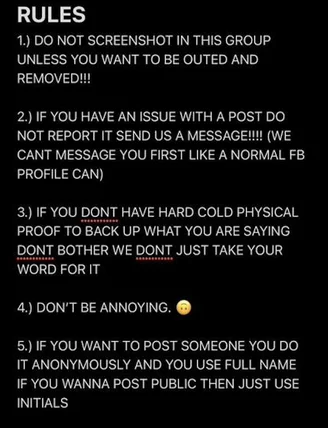Image: Stable Diffusion.
###
Note: names in this story have been omitted or changed to protect the identities of moderators and members, and no posts or comments are reproduced here (broad generalities only!) so as to uphold the expectation of privacy that comes with personal experiences shared in a closed group.
###
If you suspected your man of cheating in the days of yesteryear, you’d have limited options to smoke him out: search pockets, analyze shared bank accounts, stake out some haunts, open and honest communication …
None of them are ideal.
Today, there’s an easy solution: “Are We Dating the Same Guy?” (AWDTSG) Facebook groups.
Designed to help women avoid men deemed “dangerous or toxic” (in the words of Paola Sanchez, who founded the first AWDTSG group in New York City in 2022) these forums, which have sprung up in over 200 city- and area-specific communities, together comprise more than 4 million participants.
If you’re a North Coast resident, odds are you know at least one woman who is part of “are we dating the same guy - humboldt, CA uncensored,” a fast-growing local chapter founded by two friends about a year and a half ago.
Spanning various industries and walks of life, the nearly 4,000 members of the private group flock to the page to dish on “red flags” (negative experiences with men) and “tea” (intel on potential dates) as they splash around in the puddle that is the Humboldt County dating pool.
The AWDTSG system is simple: upload a picture of the man in question, state your story or suspicion and await the magic of the digital masses. In one fell swoop, a woman may learn there’s another woman. Maybe several others. And in confirmed cases of cheating, the two-timer is outed not only to the women he’s kept in the dark, but also to thousands of others who now know his name, face and alleged wrongdoings.
“We wanted to create a centralized place for the gossip,” one of the two anonymous moderators of Humboldt’s page, both of whom grew up and dated locally, told the Outpost in an incognito conference call.
And did they ever. The comments sections of posts in the Humboldt group are usually teeming with tidbits and tales within hours, and the tea is so hot that it can leave observers wondering, as one group member the Outpost spoke with did: “Holy shit, are all the men in Humboldt County horrible?”
While there is likely a bad news bias at work – women may be more likely to post men they already have icky feelings about, or chime in on those they’ve had negative experiences with – the reputation-ruining power of allegations made in groups of thousands raises the question: Does a man’s privacy go out the window if he’s deemed dangerous by women he’s dated?
And if so, what are the boundaries of “unsafe” behavior?
For AWDTSG participants, the answers to those questions seem to be “yes” and “any interaction that leaves a woman feeling uncomfortable.”
Posts in the Humboldt AWDTSG group tend to fall into three general categories: cheating checks, preventative screenings and warnings.
Cheating checks entail what the group’s title suggests. Women upload pictures with a simple ask: “Is he cheating?”
In the Humboldt group, adulterers often turn out to be men who frequent the coastal cities but aren’t in Eureka/Arcata full time: firefighters, pot growers or others with reason to move about and ample opportunities for infidelity.
“Basically, the people who travel,” a moderator said, “They’re the real sneaky ones.”
Screening posts are made in the early stages of a relationship (even before a first date) and feature red flag and tea emojis followed by question marks, which translate to a request for stories that may ward the poster off or incentivize her to keep talking to the post’s subject.
These are frequently met with one comment in particular: “RUN” (often accompanied by evidentiary screenshots of communications or arrest records).
The vetting function of the group comes in especially handy in the modern era of app-based and online dating, in which women set off on first dates with strangers. As one group member pointed out, Humboldt has limited rendezvous options that don’t involve either alcohol or outdoor activities in secluded places – increasing risks in first date situations.
“We all grow up being told not to meet strange men from the internet,” said Sarah, another Humboldt group member. “You used to be more likely to meet someone through a friend group or a workplace, you could see how someone interacts with their peers … . Now, it’s easier for men with bad reputations to get around that and portray different versions of themselves.”
The third variety of posts are deterrents, made solely to warn others.
These cautionary tales cover a broad swath of “walking red flag” archetypes: “man covertly dating many women at once,” “man who gets drunk and disorderly on dates,” “man who lies,” “man with drug problems,” “man who has disturbing, unrevealed arrest records,” “man with physically and/or emotionally abusive tendencies,” “sexually pushy man” … the list goes on.
The AWDTSG system breaks down when “snitches” screenshot posts and send them to the man in question, potentially adding a new element of danger for women – as this Vice piece points out. While warning posts are often made anonymously, it’s clear to see how some men would be able to identify the posting party without her name.
“For me the women who told me I was on there didn’t divulge the info of who made the post and put out my info, but the woman I went on a date with was easy for me to identify obviously,” one Reddit user wrote in an r/MensRights forum after he was allegedly the subject of complaints in an AWDTSG group.
Metropolitan AWDTSG groups, such as those in Chicago and London, have already experienced men threatening women who posted about them or suing members for defamation and invasion of privacy.
So far, the Humboldt moderators say they’ve received only “empty threats” from men who are made aware that they’ve been posted about – no lawsuits – but the mods also said that every time they’re made aware of a “snitching” incident, they worry someone will get hurt.
“That’s why we have all the anonymous features turned on, so that people can post without revealing all of their identity,” one said, “We try to tell them [group members] about plausible deniability.”
Deniability is difficult in an interconnected community like Humboldt, where each person lives within only one or two degrees of social connection from all others and anonymity exists only for relative hermits. But that’s also what makes Humboldt’s page so effective: It’s almost guaranteed that group members will have intelligence on each man posted.
“I’ve learned stuff about my own family on there,” said one of the AWDTSG Humboldt moderators.
Some Humboldt members believe the service the group offers outweighs questions of men’s privacy or safety concerns for users.
“If the cost is a man’s reputation and the benefit is a woman’s safety, I think that is less destructive than a woman being in a dangerous or abusive situation,” said Sarah, adding that while it may be “gnarly to have all your dirty laundry aired by a court of exes,” the actual U.S. court system can re-traumatize women bringing claims such as sexual assault, rape and or intimate partner violence.
AWDTSG is an “imperfect response” to the dangers that women face dating, according to Sarah.
“I wish we hadn’t gotten to this place, but this is where we’re at,” she said.
There is no question that women experience more risk in dating: nine out of every 10 rape victims in the U.S. are female and one in five women has been raped in their lifetime, compared to one in 71 men, according to data compiled by the National Domestic Violence Hotline. 45.4 percent of those female rape victims were assaulted by an intimate partners, compared to 29 percent of male victims. And one in seven American women have been injured by an intimate partner, compared to one in 25 men.
“It is fundamentally frightening to date as a woman,” one group member told the Outpost.
Humboldt’s AWDTSG group has also provided tangible support and resources to women in dangerous situations during its first years in existence, according to its moderators.
“We’ve had a few domestic abuse cases come up, some missing people, and we’ve rallied around families,” one said.
Some men oppose the pages and have called “BS” on the argument that AWDTSG groups protect women, but others believe that women are entitled to share experiences with male daters who engage in conduct unbecoming.
“There’s nothing to be fearful of if you are behaving as a respectful member of the dating community,” said Charlie, who grew up dating locally and learned of the Humboldt group from a partner.
Positive replies in Humboldt’s group support his point on dating karma: comments such as “he’s great!” or “I had a good experience!” or “that’s my ex, he’s a good guy” are not uncommon.
“No girl has ever complained about a guy not getting handsy on a first date, or asking nice questions at dinner,” said Martha, another Humboldt group member.
Charlie also said that he’s witnessed a “lack of accountability” for men dating locally that underscores the value of a forum like AWDTSG in his eyes.
“Since high school, I don’t think there’s a single female friend of mine who’s gotten off scot free dating in Humboldt County,” he said. “I think there’s this fear that a lot of men have that falsehoods are going to be shared and it’s going to ruin someone’s life, but ultimately I feel like it’s more important for women to be safe.”
Blasting men on Facebook may be a messy, ethically ambiguous way to handle the dangers of dating. But the AWDTSG system seems to be working as intended: red flags, suspicions and yucky gut feelings are being met with confirmation, and – ultimately – new members are joining “are we dating the same guy - humboldt, CA uncensored” each week.
“Is it ethical? No, not necessarily. Am I going to keep using it? Yes,” said Sarah.


CLICK TO MANAGE